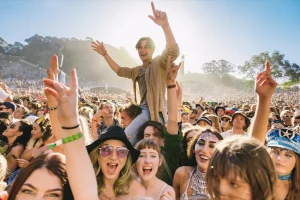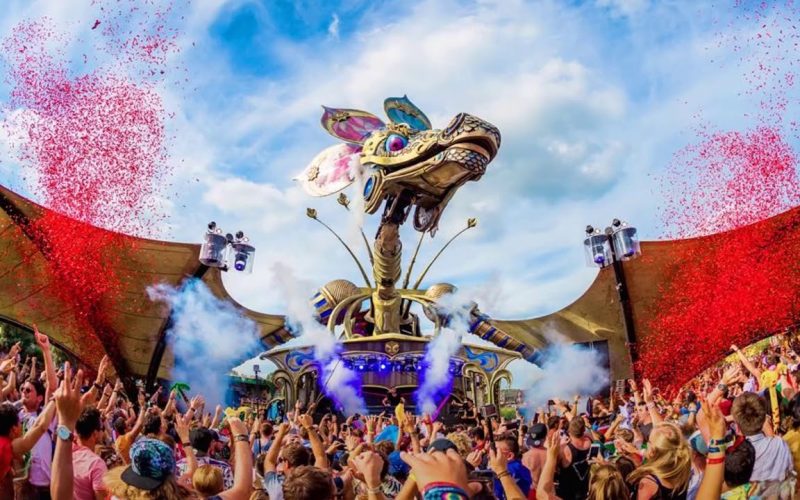Introduction
Music festivals have long been a staple of cultural expression and social gathering. From the iconic Woodstock of 1969 to the globally celebrated Coachella, these events have brought people together to celebrate music, art, and community. As we move further into the 21st century, the landscape of music festivals is evolving rapidly. This article delves into the latest trends and innovations shaping the future of music festivals, offering a comprehensive look at what attendees and organizers can expect in the coming years.
Technological Integration

-
Virtual Reality (VR) and Augmented Reality (AR)
One of the most exciting trends in music festivals is the integration of Virtual Reality (VR) and Augmented Reality (AR). These technologies are revolutionizing the way people experience live music. VR can transport fans to a virtual festival ground, allowing them to enjoy performances from the comfort of their homes. AR, on the other hand, enhances the on-site experience by overlaying digital elements onto the physical world, creating interactive and immersive environments.
-
Live streaming and Hybrid Festivals
The COVID-19 pandemic accelerated the adoption of live streaming technologies, making virtual attendance a viable option for music lovers around the globe. Hybrid festivals, which combine in-person and virtual elements, are becoming increasingly popular. These events offer the best of both worlds, allowing attendees to choose how they want to experience the festival.
-
Blockchain and NFTs
Blockchain technology and Non-Fungible Tokens (NFTs) are making their way into the music festival scene. NFTs can be used to sell limited edition digital merchandise, exclusive content, and even virtual tickets. Blockchain ensures transparency and security in ticket sales, reducing the risk of fraud.
Sustainability and Environmental Responsibility

-
Eco-Friendly Practices
Sustainability is a growing concern for festival organizers. Many are adopting eco-friendly practices to minimize their environmental impact. This includes using renewable energy sources, reducing waste, and promoting recycling. Some festivals have even gone plastic-free, encouraging attendees to bring their own reusable containers.
-
Carbon Offsetting
To address the carbon footprint associated with large gatherings, some festivals are investing in carbon offset programs. These initiatives aim to balance out the emissions produced by the event through activities like tree planting and renewable energy projects.
-
Sustainable Fashion
Fashion plays a significant role in festival culture. Sustainable fashion brands are gaining popularity, offering eco-friendly and ethically produced clothing options. Festival-goers are increasingly mindful of their fashion choices, opting for sustainable and vintage pieces.
Inclusivity and Diversity

-
Diverse Lineups
There is a growing demand for diverse and inclusive lineups at music festivals. Organizers are making a conscious effort to feature artists from various backgrounds, genres, and cultures. This not only enriches the festival experience but also promotes equality and representation in the music industry.
-
Accessibility
Ensuring that festivals are accessible to everyone is another important trend. This includes providing facilities for people with disabilities, offering sign language interpreters, and creating sensory-friendly areas. Accessibility enhancements make festivals more inclusive, allowing a broader audience to participate.
Health and Safety

-
Enhanced Security Measures
The safety of attendees is a top priority for festival organizers. Advanced security measures, including facial recognition technology and AI-powered surveillance, are being implemented to ensure a safe environment. These technologies help in identifying potential threats and managing crowd control.
-
Health Protocols
In the wake of the COVID-19 pandemic, health protocols have become a crucial aspect of festival planning. This includes measures like on-site testing, vaccination requirements, and enhanced sanitation practices. Organizers are working closely with health authorities to create safe and enjoyable experiences.
-
Mental Health Support
Recognizing the importance of mental health, some festivals are offering support services for attendees. This includes on-site counseling, wellness workshops, and designated relaxation areas. These initiatives aim to create a supportive environment where festival-goers can prioritize their well-being.
Experiential Elements

-
Themed Stages and Areas
Themed stages and areas are becoming a hallmark of modern music festivals. These immersive environments transport attendees to different worlds, enhancing the overall experience. From futuristic sci-fi settings to nostalgic retro themes, these creative spaces add a new dimension to the festival atmosphere.
-
Art Installations
Art and music go hand in hand, and festivals are increasingly featuring large-scale art installations. These interactive pieces not only serve as visual spectacles but also encourage attendee participation. Art installations create memorable experiences and provide unique photo opportunities.
-
Culinary Experiences
Food has always been an integral part of the festival experience. However, the focus is shifting towards offering diverse and gourmet culinary options. Food trucks, pop-up restaurants, and local vendors provide a wide range of choices, catering to various dietary preferences and cultural tastes.
Community and Social Impact

-
Local Engagement
Music festivals can have a significant impact on local communities. Organizers are increasingly engaging with local businesses, artists, and residents to create mutually beneficial relationships. This includes hiring local staff, featuring regional talent, and supporting community initiatives.
-
Social Causes
Many festivals are aligning themselves with social causes, using their platform to raise awareness and funds for important issues. This includes partnerships with non-profit organizations, on-site activism, and educational workshops. By championing social causes, festivals can inspire positive change and create a sense of purpose among attendees.
Conclusion
The future of music festivals is bright and full of possibilities. With advancements in technology, a focus on sustainability, and a commitment to inclusivity and diversity, these events are evolving to meet the needs and expectations of modern audiences. As we look ahead, it is clear that music festivals will continue to be a vital part of our cultural landscape, bringing people together to celebrate the universal language of music.










